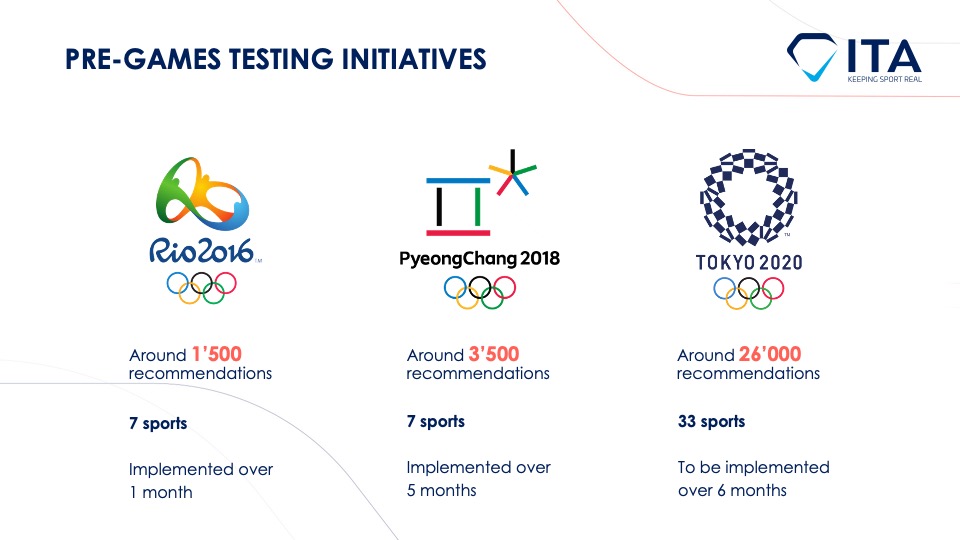Menu
 Back
Back
12 March 2021

Next to issuing recommendations in order to close testing gaps ahead of the Games, the ITA is managing a large-scale long-term storage and re-analysis program in order to make collected samples available for further testing up to ten years after the Games.
In support of the anti-doping efforts led by Summer Olympic Federations and National/Regional Anti-Doping Organisations worldwide, the ITA is working in close collaboration with these entities to make sure that any testing gaps ahead of the Tokyo 2020 Olympic Games are addressed and remediated. The ITA leads the Tokyo 2020 Pre-Games Expert Group, a pool of specialists from International Federations (IFs) – representing both team and individual sports – and National and Regional Anti-Doping Organisations (NADOs/RADOs) representing all five world continents.
The group is responsible for reviewing available information on athletes who are likely to compete in the Games. It performs a risk assessment and shares testing recommendations with other anti-doping organisations (ADOs) to ensure that effective testing is conducted globally through a coordinated effort.
In December 2020, after updating the pre-Games risk assessment and re-calibrating its efforts after the postponement of Tokyo 2020, the group issued around 26’000 testing recommendations. This high number of recommendations is due to the fact that all 33 participating sports underwent the review, and that they were issued more than six months prior to the event, at a point in time at which the pool of potentially participating athletes is still very extensive. Both of these factors, the review of all participating sports and the early issuing of the recommendations, make this the most extensive pre-Games anti-doping program ever implemented for an edition of the Olympic Games. For comparison, the pre-Games anti-doping program for the last Summer Olympics in Rio started one month prior to the event and was comprised of 1’500 recommendations for 7 at-risk disciplines.
This wide net cast well ahead of the Games aims at ensuring that athletes going to Tokyo are subject to a harmonious and proportionate testing program and can participate in fair competitions. Thousands of these recommendations have already triggered additional doping controls, and many more are already planned, resulting in over 9’000 tests to be completed in the coming weeks. The closer Tokyo 2020 gets and the smaller the pool of potentially participating athletes becomes through the qualification process, the more the recommendations will focus on the athletes who will definitely take part in the Games. To capture these evolutions and adapt accordingly, the ITA has developed a sharing platform to facilitate the communication between ADOs, as collaboration between concerned organisations is a key element to deliver an efficient pre-Games anti-doping program
Furthermore, the IOC and the ITA have secured an extended testing jurisdiction for the IOC allowing for additional testing to take place two months ahead of Tokyo 2020. This extended jurisdiction will help fill targeted testing gaps through doping controls implemented directly by the ITA.
In addition to this extensive pre-Games doping control program, the ITA developed and implemented a global long-term storage program, supported by a dedicated IOC-fund, to encourage that all samples collected on athletes going to Tokyo will be stored for up to ten years. This will allow any ADO participating in the program to re-analyse their samples at a later date should scientific breakthroughs allow for new technologies and analytical methods. Re-analysis has already proved an effective tool in detecting doping offences for previous editions of the Games and, from now on, this strategy will be available for the ADOs having collected samples during the pre-Games period. For that purpose, the ITA has established a centralised and highly secured long-term storage facility, which is already operational and ready to receive samples.
“While COVID-19 continues to impact testing efforts in several areas of the world, I am confident that with everyone’s support, the ITA will be able to deliver a robust anti-doping program for Tokyo”, states Dr. Valérie Fourneyron, the Chair of the ITA Foundation Board. “During 2020, we have seen that despite the difficult and unpredictable global situation, most out-of-competition doping controls and other anti-doping activities have been largely maintained, which gives us confidence and hope that the impact of the pandemic on the pre-Games activities will be limited. It is the first time in the history of the Olympic Games that clean sport activities will be fully managed by an independent organisation, and I can guarantee that the ITA team will do everything in its power to deliver in Tokyo the highest possible quality program for all participating athletes and countries.”